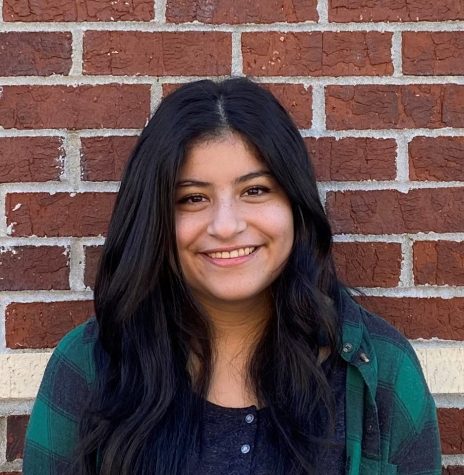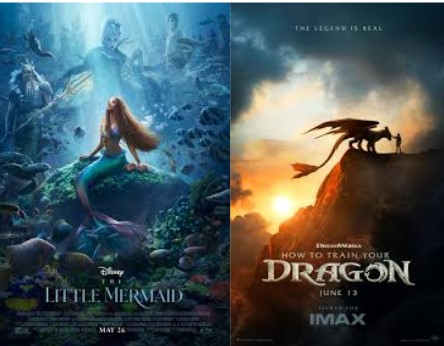Good Riddance: An Honest Album Review and Analysis

Gracie Abrams is depicted on the Good Riddance album cover. (Gracie Abrams)
Gracie Abrams’ debut album Good Riddance was released on February 24, 2023, with music production by Aaron Dessner, a founding member
of The National and the producer behind Taylor Swift’s folklore album. Good Riddance was recorded at Long Pond Studios in Hudson Valley,
New York. The album consists of 12 tracks that take the listener through a deeply introspective journey, exploring themes of self-isolation, frustration, and failed relationships. Despite the sad themes, the album’s music and Abrams’ angelic voice make for a distinctive listening experience. Good Riddance differs significantly from Abrams’ 2021 EP release of This Is What It Feels Like in its recurring themes. Before releasing the whole album, Abrams released the single “Difficult” in October of 2022. She then released “Where do we go now?” in January of 2023, followed by “Amelie” in early February, just two weeks before the full album’s release.
Track 1: Best
Being the introductory track to the rest of the album, one would expect it to be exceptional. However, “Best” is not unique but a decent track.
The beat and instrumentals in the background are a solid foundation, and the first few verses draw you into the rest of the song. “You were there all the time; you’re the worst of my crimes.” Unfortunately, the chorus is lazily written and doesn’t do the rest of the song justice. The hook is only Gracie repeating, “I never was the best to you/I never was the best to you/I never was, I never was.” This hook eliminates the great potential the song had set up by the introductory verse and fails to be anything other than surface-level lyricism. The second verse is well written, and the bridge delivers the heartbreak Abrams frequently gives in her bridges. Overall, not a terrible song but not an extraordinary one either. In terms of progression, it struggles to keep you hooked after the first chorus but ultimately saves itself from mediocrity with a fulfilling bridge.
Track 2: I know it won’t work
“I know it won’t work” conveys the ultimate desire to rekindle a relationship with someone you know it will not work out with. It’s about wanting someone you know you can’t return to. The opening verses tell a story of anxiety, anticipation, and fall-outs. It leaves you wanting to learn more and creates this excellent potential for the rest of the song. The chorus doesn’t let this potential go to waste. Abrams strikes you in her ensemble with lines like: “Why won’t you try moving on for once? That might make it easy/I know we cut off all ties, but you’re never really leaving/ And part of me wants you back but/I know it won’t work like that, huh?” It is a profound and personal account of struggling with one’s desires and weighing in the logicality and realism of it all before continuing. The instrumentals are balanced and fit perfectly with the song’s structure. It is a well-executed track and a heart-wrenching one.

work” music video (YouTube)
Track 3: Full Machine
“Full machine” begins with metaphorical lyrics and a consistent tone of pleading with a former partner. She is navigating the aftermath of heartbreak and the challenges of codependency. “I’m codependent/But tryin’ hard not to be/I’m better when you’re next to me.” The lyrics suggest that she is struggling to move on; she is experiencing the pain of separation and grappling with the urge to reconnect with her ex, as evidenced by her continuous calling. “I’m a shameless caller/You’re a full machine/ But won’t you answer tonight/And say somethin’ nice to me?” Despite her difficulties, she longs to be close to the person she was with while recognizing that this may not be the healthiest choice for her. “I know I know better/And you’re ignorin’ me/Still if you asked me to run away/I’d go easily.” Overall, the song ends with the cynical tone we were introduced to in “Best,” making it an excellent fit for track three. The piece is well-executed as well as well-written.
Track 4: Where do we go now?
“Where do we go now?” was the second leading single of the album before its full release. The song has gained attention on platforms like TikTok, with the track’s bridge rising to virality. The first verse opens up with a personal account of past events Abrams recalls with a former partner. “24th street/Where you held me, grabbed my arm.” Although the chorus is simply Abrams repeating, “Where do we go now?” it is undeniably effective in conveying the desperation and confusion Abrams is expressing regarding a tricky relationship. Ultimately Abrams is asking her partner where they should go now or how they should proceed in the relationship. The second verse continues on the narrative set up in the beginning. It is ultimately drawn out in the bridge in the most heartbreaking way. “‘Cause now I’m half of myself here without you/You’re the best in my life, and I lost you.” With these lyrics, Abrams is expressing how since the relationship ended, she feels a part of what she found in her partner is now missing. The progression of the instrumentals with the chorus and the development of the song ultimately proves itself to excel in terms of musical production and storytelling, ” ‘Where do we go now?’ is my favorite off the album. I hate that it’s all over TikTok though,” expressed Carla Sola (11), an avid Abrams fan.
Track 5: I should hate you
“I should hate you” begins with a slow-paced and mellow guitar instrumental before leading into the first verse. “Last night I spiraled alone in the kitchen/Making pretend that the furniture listened.” Next, Abrams begins telling a story of personal and internal struggles, one of isolation and contemplation. As the lyrics progress, it becomes clear that this song is about betrayal and feeling like you should hate someone because the relationship didn’t work out. Although the chorus, “I know that I should hate you,” is repeated, it’s accompanied by Abrams vocalizing in the background and the calming sound of Dessner’s instrumentals. The lyricism is alluring, with memorable lines like “Pulled the knife out my back, it was right where you left it/But your aim’s kinda perfect, I’ll give you the credit.” After the second chorus, the beat drops, and the song progresses, intensifying the overall feel of the music we were first introduced to. As if the song wasn’t already heartbreaking enough, Abrams strikes again with her powerful poetics. She delivers the most captivating and shattering line of them all, “And I swear to god, I’d kill you if I loved you less hard.” Abrams seems to tug on every single one of your heartstrings with this striking bridge, providing a sense of depth and intensity other artists fail to do. This track is amazingly expressive, and its production undeniably serves it justice.

front of Long Pond Studios in Hudson Valley, New York. Via
@gracieabrams (Twitter)
Track 6: Will you cry?
The song made me cry. I love how she’s so vulnerable and sensitive with her music. It’s a kind of song that expresses the message very clearly, and it’s a song you wouldn’t get completely focused on the beat and the rhythm. I love the song,” expressed Carly Ford-Stickney, (11) a new Abrams fan, regarding “Will you cry?” The song opens with the chorus, providing a glimpse of Abrams’ angelic vocals, followed by lyrics discussing a fallen-out relationship, whether a friendship or a romantic one. “When I scream, you’re my echo/Will you cry if I let go?” The first verse perfectly follows the narrative with the first chorus and eases into the proceeding refrain. The refrain is riveting and heart-rending with its lyrics: “Now you walk through me with my heart heavy/Breakin’ my reverie, I could die early/With your arms ’round me, habits go slowly/Would it not kill to say goodbye?” Dessner’s guitar work shines through with his signature chord progressions throughout this track. As always, Abrams delivers a lovely bridge, repeating, “You don’t move me, I see through you/I don’t follow, I don’t want to.” Once again, this repetition only adds to the effect that Abrams is spiraling and questioning something repeatedly. The outro perfectly ends the song, with Abrams asking, “Will you cry if I let go?” This track is flawlessly produced, with its execution making it a perfect breakup song where Abrams is, once again, questioning things. This piece shines through on this album.
Track 7: Amelie
I really liked it, it’s really raw and tender, Gracie manages to pull off softly talking while singing, giving a sense of someone’s sorrow through the sound of her voice but also the beauty of the relationship they had through their lyrics. It’s also just a really calming song that naturally guides your mind to deep thought,” expressed Jadon Sasse (11).”Amelie” is the third single from Good Riddance, released two weeks before the album’s full release. “Amelie” is intriguing from the beginning with its opening guitar riff. The opening verse tells a story of Abrams’ encounter with an unidentified girl that had quite an effect on Abrams. She says, “I met a girl once/She sorta ripped me open.” In the first chorus, Abrams gives the name ‘Amelie’ to the girl she is singing about. Abrams also attempts to recall more details on this encounter, including whether it was real or just a dream. “Where did you go/Amelie, Amelie, Amelie?/Where’d you go?/Or were you all in a dream/Amelie, Amelie?/I don’t know.” The name ‘Amelie’ repetition allows the chorus to flow easily, making it sound effortlessly beautiful when combined with Abrams’ vocals. The bridge is concise, further alluding to Abrams’ comfort around this person. “All your words felt like a nursery rhyme/I’m comfortable handin’ you my whole life.” Overall, Abrams’ talent for storytelling shines through in “Amelie,” making it one of Good Riddance’s shining stars.
Track 8: Difficult
“Difficult” was the very first single released from the album, with its release dating back to early October of 2022. The main topic of the song is Gracie herself and her internal struggles, showcasing even more personal vulnerability and honesty than in the past few songs. However, the opening verse ultimately needs to work on drawing the listener all that much into the music. Although the lyricism in the first verse isn’t remarkable, it is unique. It gives us a personal view of Abrams’ mindset, which feels like reading a page directly from her diary. “And I’ve been thinkin’ if I move out this year/I’ll feel my parents slipping/Away and also I’m just scared of that commitment.” The chorus is perfectly catchy but still reflects the overall serious tone of the song. By constantly repeating the word “difficult,” Abrams emphasizes the challenges she’s currently battling, hinting at the word “difficulties.” “Oh, I know spiraling is miserable/I should probably go back home/Why does that feel difficult, difficult?” As the song progresses, so does the overall beat and cadence, which reflects Abrams’ emotions intensifying. The piece demonstrates internal battles and moves well, but the lyricism could be better.
Track 9: This is what the drugs are for
“This is what the drugs are for” is another post-break-up song featuring drug usage and isolation themes. Its opening lines are, “This is what the drugs are for/Turn the lights off on the comedown.” The melodic guitar in the background sets the scene and overall mood for the rest of the song the moment it begins. It’s another track about introspection and reflection after falling out with someone but using drugs and other distractions to soothe yourself. The chorus is, without a doubt, depressing but just painful enough to keep you hooked. It begins with Gracie reflecting on her isolation: “Look now I’m alone again/I’ve gotten used to sleeping here without you.” It continues with Abrams revealing that she can not get this person off her mind, “Though I’ve tried, I can’t pretend/That I don’t sit around and think about you/When all I ever do is think about you.” The song delivers a great bridge with clear and figurative language, comparing feelings to the color blue. “You painted my life indigo/A kind of blue I hate to know/Where everything turns kind of cold.” The song ends on the same note, with Gracie thinking of the person again, like that feeling after a break-up when you just can’t rid your mind of that person. The song is perfectly placed near the end of the album.

Track 10: Fault line
In “Fault line,” Gracie sings about her struggle to escape a toxic relationship. The first verse suggests that she recognizes the negative impact of her partner but is still drawn to them- like a drug. “You’re a bad holiday, you’re the drug that I take/When I want to forget how I’m feelin’.” After the first verse, the chorus uses the metaphor of a fault line to describe the relationship, acknowledging that both partners are “cracking” under strain. Despite this awareness, Abrams continues the relationship where they both suffer. ‘I know you’re a fault line/But I’ll break too/Cracking at the same time/Does it shock you?/When I’m down/I fall right back to you, it happens.” The backing instrumentals sound similar to the ones in the previous tracks. Still, the song has a distinctive feel that differs from the others. “Fault line is one of my top picks from the album. I love the song’s feel and how it conveys the feeling of heartbreak and a toxic cycle,” expressed Hannah Daskal (12). The bridge suggests that Abrams has confided in imaginary friends about their relationship, indicating a sense of isolation and loneliness. The outro repeats the assertion that she will ultimately break, too, suggesting a sense of certainty in the eventual end of the relationship. Unfortunately, many of her songs are beginning to sound very similar to the others and have become predictable now. However, this doesn’t take away from its outstanding production and narrative. “Fault line” is slow, genuine, and realistic.
Track 11: The blue
“The blue” is undeniably one of the best tracks on Good Riddance. Not only is it the only upbeat love song on the album, but its production differs from all the other tracks. When the song opens, it’s easy to expect it to be another guitar ballad with no unique elements. With the opening verse describing a potential lover, one can’t help but wonder where Abrams is heading with this. There is a refrain before the chorus, where Abrams stops to question herself. “What are you doin’ to me now?/What are you doin’ to me now?” Ultimately, the chorus doesn’t hesitate to make the song stand out from all the rest. With its chord progressions and keys accompanying the ordinary ballad, the overall ambiance of the music is altered, now feeling more intense than before. “You came out of the blue like that/You came out of the blue like that/I never could’ve seen you comin’/I think you’re everythin’ I’ve wanted.” According to the lyrics, although this individual entered her life unexpectedly, Abrams never intended nor desired to feel this way about them. However, she finds herself irresistibly drawn to them and ultimately confides in them, even if they came “out of the blue.” To say the production excelled in this song would be an understatement. “The blue” is phenomenal and a song about falling in love.
Track 12: Right now
“Right now” is a perfect, nearly six-minute extended outro to the album. The song is divided into two verses, each depicting the singer’s experiences and emotions as she navigates the challenges of being away from home. In the first verse, Abrams uses descriptive language to convey her longing for the familiar comforts of home. She paints a picture of her surroundings, from the light in the kitchen to the sound of her mother’s voice through the walls, contrasting them with the jarring reality of being on a broken bus with strangers. The verse ends with reflecting on the internal struggle of feeling introverted in a world that never stops reminding her of its constant social activity. “All they do is remind me/That I’m still introverted.” In the chorus, Abrams uses repetition to drive home her contrasting emotions. She’s “so high” and “more alive somehow” but can’t escape the feeling of being stuck in her head, unable to look down or sit still. This also emphasizes the singer’s sense of being caught between two worlds, unable to fully immerse herself in the present moment or let go of her past. “I’m so high, but can’t look down/Left my past life on thе ground/Think I’m more alive somehow/I feel likе myself right now.” Abrams assures us in the end that she feels like herself by repeating repeatedly. This ending ultimately concludes the album with a reflective tone, one that is consistent throughout the entire album. It is a perfect fit for the concluding song because it leaves the audience to interpret it as Gracie’s ultimate takeaway from reflecting on all the heartbreaks she sang about in this album. It is a piano ballad with added keys for effect and a simple instrumental. However, the simplicity allows the lyrics and Gracie’s vocals to shine.
Overall Rating: 9/10

Amy Ferreira is a senior, and this is her first year in journalism. She took journalism because she is good at writing and enjoys talking about things....


